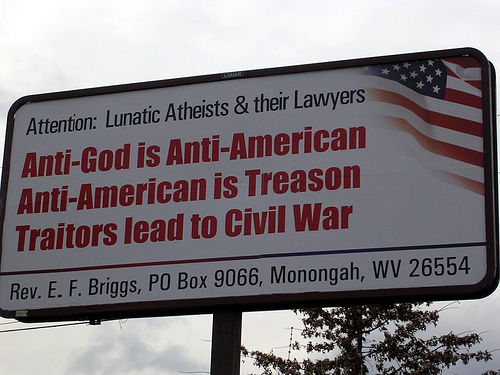
An atheist is simply someone who does not believe in gods. Why would it be necessary for religious believers to demonize such a person? What would possibly motivate some religious individuals to threaten, intimidate, or even assault someone simply because of his or her lack of religious beliefs? Every one of us comes across people with very different beliefs and values frequently without lashing out at them. What makes atheists so different?
We know that atheists are demonized like few other minority groups in the United States. I suspect we could identify a number of contributing factors (e.g., the historic association of atheism with Communism, misplaced fears about atheists trying to destroy religion and ban bibles, defensive reactions against confronting one's own ignorance and superstition, etc.). But there is an even simpler and often overlooked factor which appears to contribute to how the general public perceives and interacts with atheists: modeling.
When the average person hears about an atheist holiday sign being vandalized, he or she may experience conflicted emotions. On one hand, maybe the atheists deserved it for meddling with religious holidays. On the other hand, vandalizing someone's sign is probably illegal and certainly doesn't seem reconcilable with respecting free speech. But what happens when the average person learns that the sign was vandalized by an elected official or someone running for office?
When the average person hears someone make bigoted statements about atheists, he or she may initially have the thought, "You wouldn't say that about Catholics, or Jews, or other religious groups." But what happens when the person making false and/or bigoted statements is a state governor, a state legislator, a Catholic cardinal, a Baptist pastor, or even a U.S. senator? When the average person inhabits a culture where bigotry toward atheists is considered to be perfectly acceptable, what else is he or she to think?
We must continue the important work of raising public awareness of anti-atheist bigotry, clearly identifying bigoted statements as such. However, we also need to make sure that bigoted statements by public officials and others with any sort of cultural clout are met with swift and compelling responses. In essence, we must increase the social and political costs for such statements.